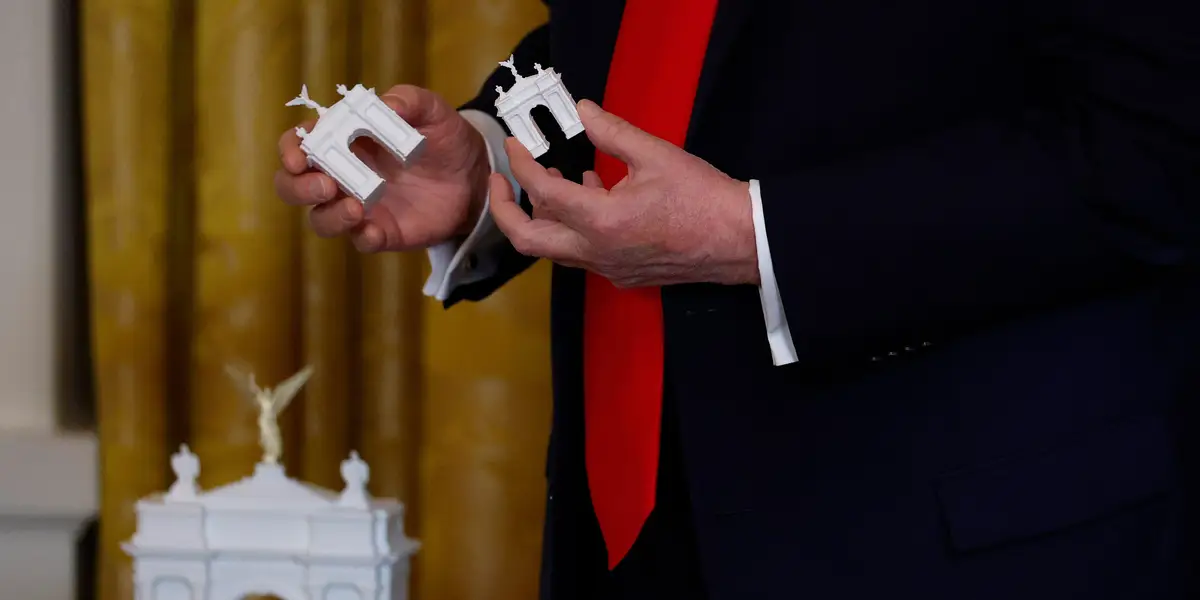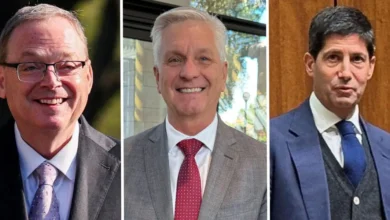Trump made major funding decisions without Congress

President Donald Trump takes control of America’s bank account.
As the government shutdown enters its fourth week and Congress is stuck in budget impasse, Trump is pushing for more power for the executive branch.
The president has made major budget and policy decisions without waiting for customary legislative approval: triggering a new wave of layoffs of federal workers, greenlighting military and law enforcement salaries during the shutdown, and beginning construction on a 90,000-square-foot ballroom.
The strategy struck a chord with lawmakers from both parties because, by law, Congress has constitutional control over America’s money.
Business Insider spoke with legal experts and policy analysts about Trump’s latest economic moves and what they mean for America’s system of checks and balances.
“This power of the purse is supposed to be the trump card because it means that, more or less, anything the president can do, Congress can veto by not paying for it,” said Walter Olson, a senior fellow at the right-leaning Cato Institute. “But if the president can get around that, he no longer has to listen.”
Trump made major funding decisions without Congress
The president made his mark on the global economy during his second term. Its rapidly evolving trade policies moved the markets, he fired the nonpartisan head of the Bureau of Labor Statistics after a disappointing jobs report in July, and he repeatedly clashed with Federal Reserve Chairman Jerome Powell over interest rates.
When Business Insider spoke to political analysts about whether the president’s actions had any historical precedent — or legal basis — the verdict was murky. For most government spending, Congress sets what are called “appropriations,” very specific line items that dictate when and how each dollar should be spent. Any attempt to change these credits typically requires legislative approval, a step in the process that Trump has bypassed.
“This is the Democrats’ disgusting strategy: inflict maximum pain on Americans so that they cling to power,” the administration wrote in a statement. Statement of October 22. “As President Trump takes decisive action to ensure the military gets paid and critical nutrition assistance programs for low-income women and children remain funded, unhinged Democrats are doing everything they can to stop him.”
Take Trump’s decision to pay the military and select law enforcement during the shutdown. Without a vote in Congress, the White House sent a Memo from October 17 stating that “In circumstances as dire as this, where there are no other appropriations providing for the payment of military pay, and where failure to pay our troops directly undermines the effectiveness of other appropriations, the President may, as Commander in Chief, direct that such appropriations be used to cover military salaries.” »
That money likely comes from the Pentagon’s standard research and development budget, but the administration has not provided more information about what money is specifically being used or whether it has been earmarked for any purpose other than military interim pay.
Most other federal workers – like government contractors and agency staff – will not receive pay until the government reopens. Troop pay was pre-approved by Congress during previous shutdowns, and members of Congress on both sides of the aisle have shown a willingness to pay troops this time. On October 24, the Pentagon said it had received an anonymous check for $130 million for military pay, which the president said came from “one of my friends“.
“It’s a particularly egregious choice when you have the opportunity to take legal action and Congress has indicated that it’s willing to do that,” said Devin O’Connor, a senior fellow at the left-leaning Center for Budget and Policy Priorities and a former official at the Office of Management and Budget, adding, “Conceptually, it opens up an extremely dark space.”
The White House also called for members of federal law enforcement, such as deportation agents, air marshals, border patrol and Secret Service, to receive “super checks” for overtime and wages missed during the shutdown. The Department of Homeland Security confirmed to Business Insider that this money comes from DHS allocations under the One Big Beautiful Bill Act, a law that allocates billions for “activities in support of the Department of Homeland Security’s mission to safeguard the borders of the United States” between 2025 and 2029.
“There are ways that what they’re doing in law enforcement could be totally kosher, or maybe more over-the-top, or they could just be doing something very illegal,” O’Connor said. “We don’t really know because we don’t have their rationale.”
Among other money moves, the Trump administration announced in October that it would dedicate $300 million in tariff revenue to fund the Special Supplemental Nutrition Program for Women, Infants, and Children (WIC) during the shutdown.
Sam Berger, a senior fellow at CBPP and former OMB official, said the money used in this case is likely revenue collected in 2024 and initially allocated to child nutrition programs, like school meals.
“I view this as an example of how they are misrepresenting what they are doing for political purposes,” Berger said, but it is probably still legitimate for Trump to use the money because “there is transfer authority” to spend it on nutrition programs.
Berger also referenced Trump’s renovation of the East Wing ballroom. Congress is not required to approve changes at the White House, but large construction projects often require federal funding — which is awarded by the Legislature.
To finance the roughly $250 million project, the president is counting on money from a personal legal settlement with YouTube, as well as potential donations from big business executives and his own funds: “The White House Ballroom is privately financed by many generous patriots, major American businesses, and, yours truly,” he wrote in a statement. October 20 Social Truth Post. Top executives from companies like Blackstone, Palantir, Lockheed Martin and OpenAI are also on the guest list for an upcoming donor dinner at the White House.
Policy analysts Business Insider spoke with also pointed to reductions in federal funding for public health, nonprofits and benefits programs in recent months. Congressional appropriations go both ways, they said. Choosing not to spend money that lawmakers have already budgeted could also be an example of executive overreach.
They cited legal precedents like that Impoundment Control Act and the Anti-deficiency law which aim to prevent government overspending and outline specific situations in which the president could rescind a funding appropriation. Examples of Trump’s seizure of funds include his previous cancellations of foreign aid to USAID or the cancellation of federal infrastructure funding for New York City.
It’s not uncommon for a president to disagree with Congress or make major funding decisions in an emergency, although analysts say Trump’s level of unilateral action is uncharted territory and larger than his first term.
Congress can update funding rules or seek legal recourse
If Congress wants to take back its purse strings, there are some things lawmakers can do.
Berger and O’Connor published an analysis last week on what they call “guardrail,” including a proposal to Congress It would require at least 60 Senate votes to approve any reduction in funding for federal programs or grants, while making it more difficult for the executive branch to unilaterally freeze grants and contracts.
Olson said Congress is “obligated to uphold the Constitution and say, ‘Mr. President, you are not obeying the law.’ Or, in this case, non-credit spending. »
It is also possible that lawmakers and organizations could sue the president over funding decisions or executive overreach, but are unlikely to achieve an outcome in the near future due to the length of the legal process. And Congress can’t move forward until it decides on a temporary budget to reopen the government.
“The problem is that the courts are not specifically designed to prevent illegality here, they are designed to declare that reality happened after the fact,” O’Connor said. “When you have to make funding decisions, it’s not particularly helpful to get a decision two years after they should have spent the funds one way or another. Because the damage is done.”
ـــــــــــــــــــــــــــــــــــــــــــــــــــــــــــــــــــــــــــــــــــــــــــــــــــــــــــــــــ
Soon, there will be articles covering various topics, such as:
Insurance, Loans, Mortgage, Attorney, Credit, Lawyer, Donate, Degree, Hosting, Claim, Conference Call, Trading, Software, Recovery, Transfer, Gas/Electicity, Classes, Rehab, Treatment, Cord Blood, Best mesothelioma lawyer, Truck accident lawyer, Buy life insurance online, Business VoIP provider, EMR software for clinics, Structured settlement companies, motorcycle injury lawyer, motorcycle injury attorney, spinal cord injury attorney, birth injury attorney, auto accident injury attorney, spinal cord injury lawyer, car injury attorney, motorcycle accident injury attorney, catastrophic injury lawyer, birth injury lawyer, workplace injury attorney, motorcycle injury attorneys, head injury lawyer, personal injury attorneys, traumatic brain injury attorney, train accident lawyer, brain injury attorney, auto injury attorney, serious injury attorney, personal injury lawyer, truck injury lawyer, injury attorneys, back injury lawyer, injury lawyer near me, injury lawyer,
If you would like to see these articles, please write so in the comments.





